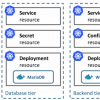Related Content
 |
Using a Multibranch Jenkins Pipeline with Docker Typically, code for a Docker image is developed using multiple GitHub branches, with each branch being the code for a single Docker image tag. However, having to create and run a Jenkins pipeline for each GitHub branch can be cumbersome. Try a multibranch pipeline to integrate multiple GitHub branches simultaneously. |
|
 |
4 DevOps Antipatterns to Avoid While lots of organizations are making good progress with DevOps, there are others that have fallen prey to common DevOps antipatterns. Signs usually include a slowdown or stopping of progress toward a fully collaborative organization operating at a high velocity. Here are four DevOps antipatterns to watch out for. |
|
 |
Building Security into DevOps: A Slack Takeover with Larry Maccherone Thought leaders from the software community are taking over the TechWell Hub to answer questions and engage in conversations. Larry Maccherone, senior director at Comcast, hosted this Slack takeover and discussed what DevSecOps means, how to get started with security, and the changing role of security specialists. |
|
 |
Using Kubernetes Helm Charts for Increased DevOps Collaboration A Docker image is usually designed for a baseline functionality and can then be customized. However, customized resource definitions are typically not shared among other users who might have a similar application requirement. Here’s where Helm charts for Kubernetes can help reduce rework and increase collaboration. |
|
 |
How to Get Security Groups to Join Your DevSecOps Journey DevSecOps shifts security practices left and assures earlier that your application isn't vulnerable to breaches. But convincing a security group to get on board with your DevSecOps journey may not be an easy task. These four points can help you prove to your security group that DevSecOps is in everyone’s best interest. |
|
|
|
Why Use Kubernetes for Your Container Management? Kubernetes is the most commonly used open source orchestration framework for containers. It’s used for automating deployment, scaling, and management of application containers and works with many container tools, including Docker. But what makes Kubernetes so popular? And would it be useful to you? Let's take a look. |
|
 |
5 Ways to Shift Performance Testing Left Performance testing is often a barrier to accelerating software delivery. Because you need a production-like environment, performance testing often waits until the entire application is complete. But you shouldn't wait until then to get started. You can begin testing earlier to reduce rework and address issues sooner. |
|
 |
How DevOps Has Changed the Landscape of Testing The focus on automation and “continuous everything,” from integration, deployment, and now all the buzz about continuous testing, makes the daily activities of a tester in DevOps challenging. Testers may be used to controlling quality—or thinking they do—but they need to pivot to assuring their teams focus on quality. |





